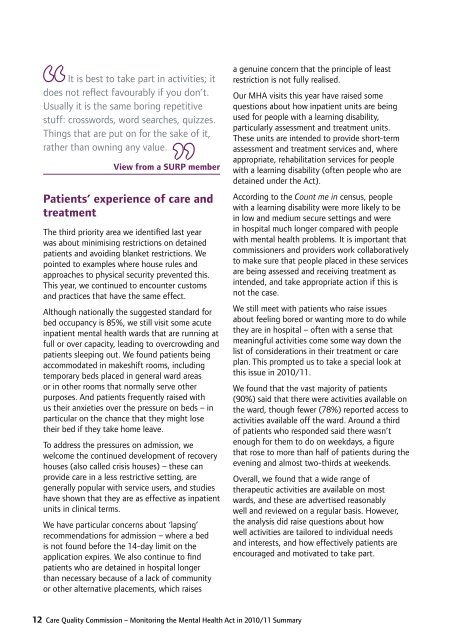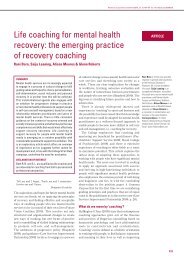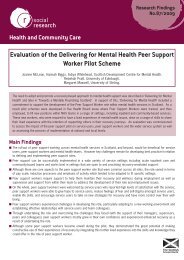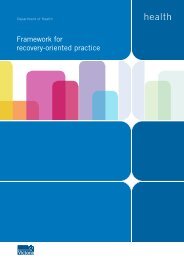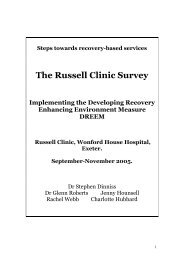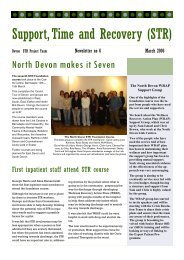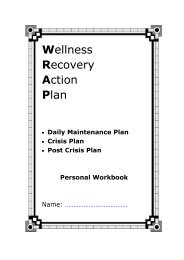Mental Health Act Annual Report 2010/11 - Care Quality Commission
Mental Health Act Annual Report 2010/11 - Care Quality Commission
Mental Health Act Annual Report 2010/11 - Care Quality Commission
You also want an ePaper? Increase the reach of your titles
YUMPU automatically turns print PDFs into web optimized ePapers that Google loves.
It is best to take part in activities; it<br />
does not reflect favourably if you don’t.<br />
Usually it is the same boring repetitive<br />
stuff: crosswords, word searches, quizzes.<br />
Things that are put on for the sake of it,<br />
rather than owning any value.<br />
View from a SURP member<br />
Patients’ experience of care and<br />
treatment<br />
The third priority area we identified last year<br />
was about minimising restrictions on detained<br />
patients and avoiding blanket restrictions. We<br />
pointed to examples where house rules and<br />
approaches to physical security prevented this.<br />
This year, we continued to encounter customs<br />
and practices that have the same effect.<br />
Although nationally the suggested standard for<br />
bed occupancy is 85%, we still visit some acute<br />
inpatient mental health wards that are running at<br />
full or over capacity, leading to overcrowding and<br />
patients sleeping out. We found patients being<br />
accommodated in makeshift rooms, including<br />
temporary beds placed in general ward areas<br />
or in other rooms that normally serve other<br />
purposes. And patients frequently raised with<br />
us their anxieties over the pressure on beds – in<br />
particular on the chance that they might lose<br />
their bed if they take home leave.<br />
To address the pressures on admission, we<br />
welcome the continued development of recovery<br />
houses (also called crisis houses) – these can<br />
provide care in a less restrictive setting, are<br />
generally popular with service users, and studies<br />
have shown that they are as effective as inpatient<br />
units in clinical terms.<br />
We have particular concerns about ‘lapsing’<br />
recommendations for admission – where a bed<br />
is not found before the 14-day limit on the<br />
application expires. We also continue to find<br />
patients who are detained in hospital longer<br />
than necessary because of a lack of community<br />
or other alternative placements, which raises<br />
a genuine concern that the principle of least<br />
restriction is not fully realised.<br />
Our MHA visits this year have raised some<br />
questions about how inpatient units are being<br />
used for people with a learning disability,<br />
particularly assessment and treatment units.<br />
These units are intended to provide short-term<br />
assessment and treatment services and, where<br />
appropriate, rehabilitation services for people<br />
with a learning disability (often people who are<br />
detained under the <strong>Act</strong>).<br />
According to the Count me in census, people<br />
with a learning disability were more likely to be<br />
in low and medium secure settings and were<br />
in hospital much longer compared with people<br />
with mental health problems. It is important that<br />
commissioners and providers work collaboratively<br />
to make sure that people placed in these services<br />
are being assessed and receiving treatment as<br />
intended, and take appropriate action if this is<br />
not the case.<br />
We still meet with patients who raise issues<br />
about feeling bored or wanting more to do while<br />
they are in hospital – often with a sense that<br />
meaningful activities come some way down the<br />
list of considerations in their treatment or care<br />
plan. This prompted us to take a special look at<br />
this issue in <strong>2010</strong>/<strong>11</strong>.<br />
We found that the vast majority of patients<br />
(90%) said that there were activities available on<br />
the ward, though fewer (78%) reported access to<br />
activities available off the ward. Around a third<br />
of patients who responded said there wasn’t<br />
enough for them to do on weekdays, a figure<br />
that rose to more than half of patients during the<br />
evening and almost two-thirds at weekends.<br />
Overall, we found that a wide range of<br />
therapeutic activities are available on most<br />
wards, and these are advertised reasonably<br />
well and reviewed on a regular basis. However,<br />
the analysis did raise questions about how<br />
well activities are tailored to individual needs<br />
and interests, and how effectively patients are<br />
encouraged and motivated to take part.<br />
12 <strong>Care</strong> <strong>Quality</strong> <strong>Commission</strong> – Monitoring the <strong>Mental</strong> <strong>Health</strong> <strong>Act</strong> in <strong>2010</strong>/<strong>11</strong> Summary


